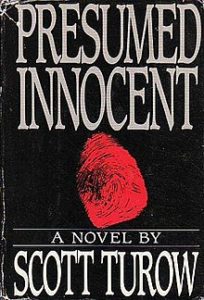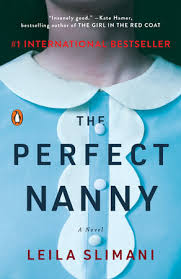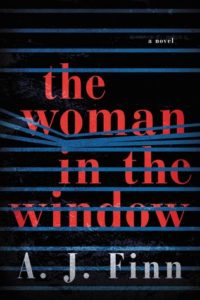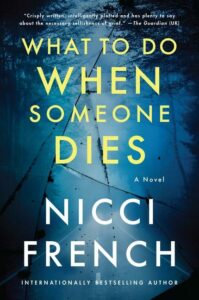Apart from love, one of the largest emotions in any of our lives is grief. In the natural course of events, we will grieve for our grandparents and our parents and perhaps for friends as well. It is something we have to learn how to do, learn how to live with.
There is so much death in thrillers. To take the most flagrant examples, there are far more murders in Norwegian thrillers than there are actual murders in Norway. (In 2018 there were only twenty-five homicides.) But where is the grief? Obviously there is plenty of grieving in the margins of stories. We witness the distress of victims’ families. But what about the main characters? There is trauma, anger, bitterness, world-weariness, cynicism. Why is it so hard to think of main characters who grieve?
Famously, in 1969 the psychiatrist Elizabeth Kübler-Ross outlined the five stages of grief: denial, anger, bargaining, depression, acceptance. Let’s be clear: there’s nothing particularly scientific about these ‘stages’, about how many there are, about their order. Is everyone really angry? Is everyone depressed? Isn’t it OK just to be sad? But even the many experts who take issue with Kübler-Ross agree that grieving is a process that involves a mixture of emotions, some of them potentially disabling, and that conclude, if the mourning process is successful, in some kind of acceptance.
For everyone, the process is basically an internal one. It may involve emotional ‘work’ but it doesn’t involve tracking down the killer, taking revenge (unless we count those as fantasies indulged in the anger stage). Writers (and readers), however, are drawn to leading characters who are active, who go out into the world and solve problems. Grief is the opposite of that, and grieving involves the acceptance that some problems cannot be fixed, they can only be lived with. That acceptance can be immensely important in getting through the dark periods of our life but it is a very bad basis for a thriller. So what do we do with grief when we write a thriller?
We have chosen ten books which make use of grief, or pointedly avoid it, or turn it into something else.

Murder on the Orient Express by Agatha Christie (1934)
Christie, in her life and her work, rejected the whole idea of grieving. This was the woman who, in response to personal calamity, had a nervous breakdown, went missing, came close to killing herself and then never spoke of it again. Her detectives Hercule Poirot and Miss Marple seem entirely untouched by their experience of murder and human evil. In this, one of her most famous books, she deals with the most emotive of subjects, the kidnapping and murder of a child. How should those who knew the child respond? Spoiler alert: don’t get sad, get even.

Rebecca by Daphne du Maurier (1938)
The woman in the title is dead and the nameless heroine marries the widower, Maxim de Winter. She partly falls in love with him out of a tender feeling for the grief he must be feeling for his first wife. But is the grief too much? Does it mean that there is no room left in his heart for his second wife? How can we tell what another person, even our husband, really feels? This is a whole novel that turns on the question of whether someone is really grieving or feeling something else.

Presumed Innocent by Scott Turow (1987)
Turow’s debut, and still his masterpiece, makes brilliant use of first person narration. Rusty Sabich is on trial for the murder of his lover, who haunts the novel and Sabich himself. Did he really do it? The evidence against him looks bad. We know he’s lying to the court. But also: why isn’t he sadder? We expect grief, even private grief, and we feel troubled when Sabich doesn’t display it—even to the reader. But does it mean he’s guilty?

Tell No One by Harlan Coben (2001)
Here, finally, is a book that starts with a hero experiencing full-on grief for his wife, who, eight years earlier, was kidnapped and murdered. But this apparent exception to the rule that grief must be displaced in order to be used in a thriller is actually another example of it. Suddenly he gets a mysterious message which suggests his wife may be still alive. He’s reached the stage of acceptance under a misapprehension. Thrillers are all about ‘what if’s’ and here Coben asks: what if the ‘denial’ stage and the ‘anger’ stage were the authentic ones. Elizabeth Kübler-Ross would not approve.

Mystic River by Dennis Lehane (2001)
In our search for grief in thrillers, this was one of the first books that came to mind. Two boys watch helplessly while a friend is kidnapped (and then sexually abused). Twenty-five years later, they are drawn back together when one of them is a policemen, one the parent of a victim and one a suspect. Like many thrillers, this uses the idea of terrible tragedy in the past and its emotional traces in the present. The emotions of the three main characters are raw and powerful but they aren’t exactly grief, which involves some kind of acceptance. They are far too unresolved for that: intense guilt and the psychic damage cause by violent sexual abuse.

Cast of Shadows by Kevin Guilfoyle (2005)
This remarkable thriller begins with the brutal rape and murder of Davis Moore’s teenager daughter. It’s going to be about grief, right? These are the book’s opening sentences: ‘This wasn’t grief Davis felt, staring at her so-still feet pointing at impossible angles to the tight synthetic weave of charcoal carpet. Grief is born. Grief matures. Grief passes.’ This is an entire thriller about the refusal of grief and the brilliantly original way that Moore, a doctor, sets out to find his daughter’s killer.

Dead Simple by Peter James (2005)
This is the first of Peter James’s outstanding series about the English detective, Roy Grace. Traditionally, detectives in thrillers have a wound: alcoholism, a criminal past, a troubled private life. James’s wound is that he is grieving for his wife, who disappeared eight years earlier. Crucially, it’s not the driving emotion of this book. It’s what haunts Grace as he deals with other crimes. Until, a few books later… well, that would be telling.

The Perfect Nanny by Leila Slimani (2018)
This harrowing book also begins, almost unbearably, with the murder of two small children but it then becomes a very unusual kind of thriller. We know who the killer is, we know how the story is going to end (horribly). The book is full of terrible emotions: shame, humiliation, sadness, arrogance, moments of joy. No grief. We know that will come after we have closed the book.

The Woman in the Window by A.J. Finn (2018)
This extraordinary debut, the top-selling thriller of 2018, riffs brilliantly on themes from Alfred Hitchcock, especially on his masterpiece, Rear Window. In Hitchcock’s movie, James Stewart, disabled by a huge plaster cast on his leg, seems to observe a murder in a house opposite. In Finn’s novel, the heroine seems to observe a murder but she is disabled by a terrible agoraphobia. She’s incapable of leaving her house. But what caused it? Half way through the novel we get the shocking answer and it’s a powerful response to what we said—not entirely accurately—can’t be done in a thriller.
***


















